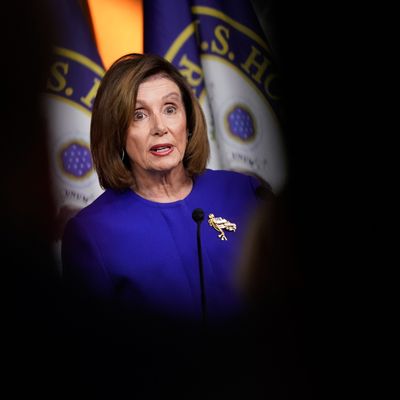
While a lot of questions remain about how and when the Senate impeachment trial of Donald Trump will unfold, this week should bring that historic event much closer. We won’t know the exact timetable until Nancy Pelosi meets with her caucus on Tuesday, but a resolution appointing House impeachment managers and dispatching them to formally present articles of impeachment to the Senate (which in turn will trigger a trial) should happen by the end of the week. It’s possible Pelosi’s “trigger’ will have its own trigger — some sort of contingency clause requiring Mitch McConnell to disclose trial procedures before the resolution take effect — but more likely she is satisfied that her brief delay in sending over the articles has drawn sufficient attention to McConnell’s efforts to shut down any hearing of witnesses or additional evidence during the trial and put pressure on potentially wavering Republicans.
If, as appears likely, the trial begins immediately after the Martin Luther King Jr. holiday, it will begin with the swearing in of the presiding officer, Chief Justice John Roberts, and then of the Senate. At that point McConnell is expected to unveil detailed rules for the conduct of the trial, to be approved by Senate Republicans without any negotiations with Democrats, authorizing the impeachment managers and the president’s counsel to present their arguments, followed by consideration of motions to hear witnesses and new evidence when that’s all done.
Senate Democrats will then challenge Roberts and the professional Senate parliamentarian advising him with motions and arguments that McConnell’s “rules” notwithstanding, the Senate’s standing rules allow for consideration of witnesses and other evidence unless 67 votes are available to amend them (as they were in 1996 when the ad hoc rules were adopted unanimously). If Roberts agrees, Democrats will ask him to call witnesses and admit evidence, and the chief justice in turn will likely ask the Senate itself to decide on specific motions, leading to a series of votes where McConnell’s bloc of 51 compliant Republicans will be put to the test. So despite McConnell’s plans to put off these confrontations until after the two sides’ arguments are heard, they could arrive earlier.
One wild card in the trial, of course, will be the president’s behavior. After apparently being talked into going along with a limited trial with no witnesses, this weekend Trump suddenly returned to his much earlier position that there shouldn’t be any trial at all:
McConnell has to get Trump back off that ledge, and also make sure he doesn’t appoint a wild bunch of House Republicans to his trial defense team, turning the solemn event into a circus and offending the self-conscious if somewhat ridiculous dignity of the Senate.
Meanwhile, Democrats will need to quickly agree on their trial strategy, which is likely to revolve around continued efforts to suggest that McConnell is engineering a cover-up while seeking to peel off just enough vulnerable Republicans to call a witness Trump doesn’t want, most notably former national security adviser John Bolton, who has offered to testify. In addition, once the trial schedule is generally known, the four senators still in the Democratic presidential contest (Michael Bennet, Amy Klobuchar, Bernie Sanders, and Elizabeth Warren) will be frantically making plans to reach out to early-state voters by any means possible each moment they are not trapped in the trial.






























